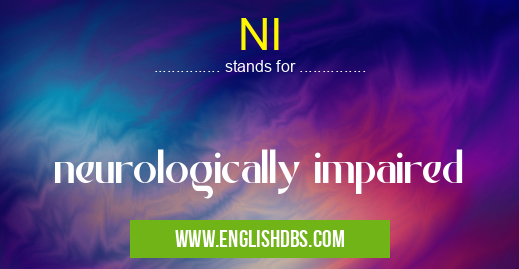What does NI mean in BRITISH MEDICINE
NI is an abbreviation used to refer to someone who is neurologically impaired. This term may refer to any impairment of the nervous system, ranging from mild symptoms to profound disabilities. In this article, we answer some common questions about NI and its associated impairments.

NI meaning in British Medicine in Medical
NI mostly used in an acronym British Medicine in Category Medical that means neurologically impaired
Shorthand: NI,
Full Form: neurologically impaired
For more information of "neurologically impaired", see the section below.
Essential Questions and Answers on neurologically impaired in "MEDICAL»BRITMEDICAL"
What types of impairments may be associated with NI?
A wide range of impairments can be caused by neurological issues, including intellectual disability, physical disability, sensory issues, communication difficulties, seizures and behavioral problems.
What are some possible causes of NI?
There are many potential causes for neurological impairments, including birth defects or genetic disorders, head injuries or trauma, infections such as meningitis or encephalitis or strokes, developmental disorders such as autism spectrum disorder and cerebral palsy, tumors or brain malformations and degenerative diseases like multiple sclerosis and Alzheimer's disease.
Are there treatments available for NI?
Depending on the specific cause of the impairment and its severity, treatment may vary greatly in terms of options and availability. Treatment plans can include medication management for seizures or other symptoms, both physical therapies such as occupational therapy or speech therapy as well as psychological therapy like cognitive-behavioral therapy to help manage disabilities more effectively. Surgery can also be used under certain circumstances.
How does someone get diagnosed with NI?
A diagnosis typically involves a combination of evaluations that can include imaging tests such as MRIs or CT scans to look at structures in the brain; laboratory tests to measure proteins in the blood that may indicate certain conditions; cognitive assessments; and full physical examinations. It is important to remember that each case is unique so diagnosis will depend on individual needs.
How can I best support someone living with NI?
The most important thing you can do when supporting someone living with an impairment is understanding their needs and challenges — empathy goes a long way! You should also research what services are available in your community so you can find useful resources that may help them lead the best life possible. Additionally, it always helps to talk openly about the person's impairment — speaking openly about it rather than avoiding the topic reinforces acceptance of their condition which can go a long way towards helping them cope more effectively.
Final Words:
Neurologically impaired (NI) refers to any type of disruption caused by damage to the nervous system - ranging from mild symptoms all way up through severe disabilities. Knowing more about this disorder and how it affects individuals allows us understand better how best we can support those who have it. The key here is patience, open conversation about condition, research for resources, understanding needs & challenges and provide empathy.
